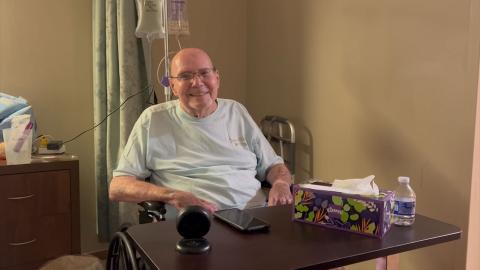'Every Moment Together is a Gift': Nurses Providing Bridge of Support for Dying Patients and Their Families
For COVID-19 and other hospital patients across the country, nurses are playing a bigger role than ever in the midst of pandemic restrictions.
With visitor limitations or bans in most medical settings, nurses now often provide the main physical contact for patients and serve as the bridge between them and their loved ones when the patient is too ill to reach out.
Dr. Jaime Holland is a nurse educator who says she's witnessing great stress among her former students who are seeking her support and counsel at all hours of the day.
"The words I'm hearing are 'this is awful. This is very distressing. This isn't ok,'" she said.
Holland says nurses feel the loss of not being able to bring family into the hospital to visit their patients. Nurses also feel pressure around their personal protective equipment (PPE) with protocols regularly changing.
"They're afraid of putting the PPE on wrong," she said. Holland says that nurses often watch each other put it on as a safeguard but the pressure never lets up as no nurse wants to infect themselves or anyone else.
"Now you're putting not just yourself at risk but you're putting your family at risk. You're putting your co-workers at risk. You're putting your children at risk," she explained.
Some nurses and healthcare workers have moved into campers or tents or home garages to avoid contact with family members. Others are living in their homes but keep their distance.
On the job, nurses are working harder to provide emotional support for their patients who can't see their families. Chelsey McLaughlin, a first-year nurse in Virginia, says she tries to make time for important conversations.
"I feel that I should make sure that they're ok," she said. "Talk to them as if they're my own family member--try to get their real feelings out."
One of the toughest parts of the job right now is support for COVID patients who are dying and separated physically from family.
Shelby Roberts, a nurse at a COVID-unit in an Alabama hospital, used her own phone to help one of her patients. She put the phone in a plastic bag and got six family members on the line to talk with their loved one.
"I had it up to her ear. They said their good-byes. They prayed with her and then we all sang 'Amazing Grace,'" said Roberts. "I held her hand and we put on the Gospel music."
For Roberts and other nurses, these are challenging moments. For family members, the help these nurses provide is powerful but the inability to be physically present can also be devastating as those left behind struggle with closure.
Dr. Danny Holland, a licensed professional counselor and assistant professor in the School of Psychology and Counseling at Regent University, says it's not surprising that this new dynamic is so painful. "We are not only robbed of a loved one--we are robbed of the ability to gather together and honor them," he said.
The counselor says the family can take comfort in knowing that their loved one is not alone, but supported by nurses and other hospital staff. "Nurses are trained to protect the individual's dignity and ritual of the process of death," he explained. "There have been reports of hospital staff standing by in vigil bedside."
It's also important he says to recognize that physical separation doesn't mean a patient doesn't have family members who love and care for them.
"Dying alone doesn't mean dying unloved," Holland said. "It simply means the absence of a loved one being with us in that moment of death."
For many patients and nurses, music is a huge comfort right now. In Arkansas, nurse Michael Stramiello is playing his guitar for patients while on his work breaks. He plays their requests which often include worship music.
For McLaughin, the song "Waymaker" is a personal favorite and some of her patients also enjoy it. She'll often play their requests on her phone while they're taking medicine.
Her advice for families? Feel free to call and nurses will do whatever they can to talk or get a patient on the line.
Holland says this pandemic is a reminder to everyone to be pro-active in relationships.
"COVID-19 or not, don't take for granted opportunities to connect now," he said. "Connect and love those around you sincerely and deeply, cherishing every moment because as COVID has reminded us, life is fragile and every moment together is a gift."
FOR CBN NEWS CONTINUING COVERAGE ON COVID-19, CLICK HERE.




